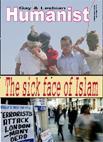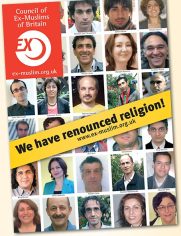 Gay rights are the bellwether that indicates whether a society lives by civilised values, said Polly Toynbee, journalist and commentator, who was the guest speaker at a packed annual lunch of the Gay and Lesbian Humanist Association on Saturday 10 November in London.
Gay rights are the bellwether that indicates whether a society lives by civilised values, said Polly Toynbee, journalist and commentator, who was the guest speaker at a packed annual lunch of the Gay and Lesbian Humanist Association on Saturday 10 November in London.
Ms Toynbee, who is one of The Guardian’s senior columnists, told the humanist group that the level of commitment to human rights that any given nation has can be measured by its attitudes to its gay community. By that measure, Britain wasn’t doing too badly. She was critical of religious attacks on the human rights of gay people and alarmed at the rise of religious influence in the political sphere.
It’s easier to oppose Christian homophobia than that which emanates from Islam, she said. “It’s called ‘Islamophobic’ when we fight against the Islamic view of women or gay rights. It’s not Islamophobic. As dedicated humanists, we’re the ones who can say we’re against the whole lot of it. We know we’re not being racist. What they stand for is dreadful and harmful and awful – we are the ones who cannot be silenced. There has been a lot of turning-a-blind-eye to Islam. We are the ones who stand for progressive policies and have a unique voice to say so.”
GALHA news release, 12 November 2007
“We know we’re not being racist”? Is Polly Toynbee not addressing the same Gay and Lesbian Humanist Association whose then magazine Gay & Lesbian Humanist published the notorious “Sick face of Islam” issue only two years ago?
(Sample quotes: “it is not racist to be anti-immigration or anti-Islam” … “the reckless and mismanaged immigration polices of successive governments have led to the demographics of our major towns and cites being for ever changed by huge numbers of foreign settlers” … “the fastest-growing religion is Islam. Chillingly, it continues to grow like a canker, both through immigration and through … unrestrained and irresponsible breeding”.)
Wouldn’t a warning be in order here about how hostility to religious faith, when the faith in question is practised overwhelmingly by non-white minority communities, can in fact very easily tip over into the most appalling racist bigotry? If Toynbee made such a point at the GALHA lunch, it certainly doesn’t appear in their report of her speech.
It’s not that Toynbee is incapable of recognising that attacks on the beliefs and religious practices of a minority ethno-religious group can be a cover for racism. It’s just that she applies double standards.
This was evident in an Independent article from 1997 where she wrote: “I am an Islamophobe…. I am also a Christophobe.” She continued: “If I lived in Israel, I’d feel the same way about Judaism.”
But the fact that she doesn’t live in Saudi Arabia hasn’t prevented Toynbee from denouncing Islam. Restricting herself to condemning the religion that is dominant in the society in which she might live applies only to Judaism, it would appear. No doubt this is because, in the UK, with its long and shameful history of antisemitism, a non-Jew denouncing Judaism would rightly be construed as racist, or at least as giving credibility to racists. And if she was happy to call herself a Christophobe and an Islamophobe, why did Toynbee baulk at calling herself a “Judeophobe”? Perhaps for the same reason?
And, come to think of it, if Toynbee describes herself as an Islamophobe, why does she feel the need to indignantly assert that condemnation of Islam over gay rights is “not Islamophobic”? Or has she changed her position on that in the course of the past decade?

 “The former ‘liberal’ who becomes an outspoken right-winger has become an American political archetype. Ronald Reagan and David Horowiz are two prime examples of the breed….
“The former ‘liberal’ who becomes an outspoken right-winger has become an American political archetype. Ronald Reagan and David Horowiz are two prime examples of the breed…. ne reviews Bernard-Henri Lévy’s new book Ce grand cadavre à la renverse. According to BHL there is, Johnstone writes, “a new ‘fascist’ enemy to combat: ‘Islamofascism’ or, as he prefers to call it, ‘Fascislamism’.”
ne reviews Bernard-Henri Lévy’s new book Ce grand cadavre à la renverse. According to BHL there is, Johnstone writes, “a new ‘fascist’ enemy to combat: ‘Islamofascism’ or, as he prefers to call it, ‘Fascislamism’.” Johann Hari has found a new hero: “Ehsan Jami is an intelligent, softly-spoken 22-year-old council member for the Dutch Labour Party. He believes there should be no compromise, ever, on the rights of women and gay people and novelists and cartoonists. He became sick of hearing self-appointed Islamist organisations claiming to speak for him when they called for the banning of books and the ‘right’ to abuse women. So he set up the Dutch Council of Ex-Muslims. Their manifesto called for secularism – and an end to the polite toleration of Islamist intolerance. As he put it: ‘We want people to be free to choose who they want to be and what they want to believe in’.”
Johann Hari has found a new hero: “Ehsan Jami is an intelligent, softly-spoken 22-year-old council member for the Dutch Labour Party. He believes there should be no compromise, ever, on the rights of women and gay people and novelists and cartoonists. He became sick of hearing self-appointed Islamist organisations claiming to speak for him when they called for the banning of books and the ‘right’ to abuse women. So he set up the Dutch Council of Ex-Muslims. Their manifesto called for secularism – and an end to the polite toleration of Islamist intolerance. As he put it: ‘We want people to be free to choose who they want to be and what they want to believe in’.”